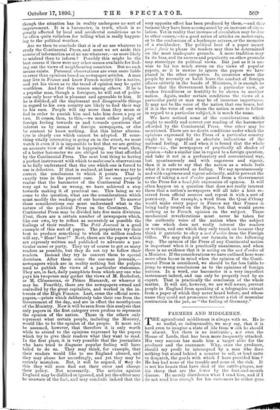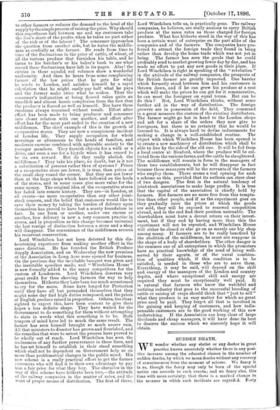FARMERS AND MIDDLEMEN. T HE agricultural middleman is always with us.
He is., so useful, so indispensable, we may say, that it is hard even to imagine a. state of life from w lich he should be absent. Yet there is no institutio”, not even the House of Lords, that has been more frequently attacked. His very success has made him a target alike for the. producer and the consumer. Why, cries the producer,. should my profit be intercepted by a man who does. nothing but stand behind a counter to sell, or load carts to despatch, the goods with which I have provided him ? He has had none of the trouble and none of the risk. It is not his beasts that have died of the cattle-plague, nor his sheep that are the fewer by the foot-and-mouth disease. He merely distributes what I send him, and if I do not send him enough for his customers he either goes. to other farmers or reduces the demand to the level of the supply by the simple process of raising the price. Why should this superfluous link between me and my customers take the lion's share of the profits when he takes no part either of the risk or of the labour ? The consumer approaches the question from another side, but he hates the middle- man as cordially as the farmer. He reads from time to time of the fluctuations in the price of cattle, of wheat, of all the various produce that furnishes his table, and he turns to his butcher's or his baker's book to see what record these fluctuations have left in its pages. Alas ! the entries in these squalid red volumes show a wonderful uniformity. And then he hears from some complaining farmer of the low prices that he gets for what he sends to London, and satisfies himself by a rapid calculation that he might easily pay half what he pays and the farmer make twice what he makes. Thus the consumer's indignation at being fleeced takes quite an unselfish and almost heroic complexion from the fact that the producer is fleeced as well as himself. Nor have these emotions always remained without result. Effort after effort has been made to bring producer and consumer into closer relation with one another, and effort after effort has for the most part ended in the creation of a new middleman. The chief example of this is the growth of co-operative stores. They are now a conspicuous incident of London life. They supply occupation for whole mornings or afternoons to the heads of families, and moderate exercise combined with agreeable society to the younger members. They furnish objects for a walk or a drive, and even a use for a bicycle when it has ceased to be its own reward. But do they really abolish the middleman ? They take his place, no doubt, but is it not a substitution of persons rather than of systems ? Prices at a co-operative store are lower, it is true, than prices at the small shop round the corner. But they are not lower than at the huge shops which have followed on the heels of the stores, and in some cases give more value for the same money. The original idea of the co-operative stores has faded into remote history. They are—in London, at all events—no more co-operative than any other joint- stock concern, and the belief that customers would like to save their money by taking the burden of delivery upon themselves has proved to have but a scanty foundation in fact. In one form or another, under one excuse or another, free delivery is now a very common practice in stores, and in proportion as this change becomes universal the last vestige of distinction between a store and a shop will disappear. The convenience of the middleman secures his recurrent resurrection.
Lord Winchilsea has not been deterred by this dis- heartening experience from making another effort in the same direction. He has founded the British Produce Supply Association, and on Wednesday the new premises of the Association in Long Acre were opened for business. On the previous day the inevitable banquet was given and the inevitable speeches made, and "Winchilsea House" is now formally added to the many competitors for the custom of Londoners. Lord Winchilsea deserves very great credit for thus showing farmers the way to help themselves. Hitherto they have been too much accustomed to cry for the moon. Some have longed for Protection until they have all but persuaded themselves that they might some day find high duties reimposed, and the prices of English produce raised in proportion. Others, too clear- sighted to expect this, have been content to give their hopes a less definite shape. They have waited for the Government to do something for them without attempting to state in words what this something is to be. Both tempers of mind have led to much the same result. The farmer has seen himself brought so much nearer ruin. All that ministers to disaster has grown and flourished, and the remedies that were to arrest the process have proved to be wholly out of reach. Lord Winchilsea has seen the uselessness of any further perseverance in these lines, and• he has set himself to establish in their stead something which shall not be dependent on Government help or on more than problematical changes in the public mind. His new scheme is a really practical effort to get the farmer customers who will find it to their own advantage to pay him a fair price for what they buy. The obstacles in the way of this scheme have hitherto been two,—the attitude of the railway companies in the matter of rates, and the want of proper means of distribution. The first of these, Lord Winchilsea tells us, is practically gone. The railway companies, he believes, are really anxious to carry British produce at the same rates as those charged for foreign produce. What has hitherto stood in the way of this has been a certain want of enterprise on the part alike of the companies and of the farmers. The companies have pre- ferred to attract the foreign trade they found- in being rather than develop the home trade which was not yet in being. The farmer has seen the goods that he could profitably send to market growing fewer day by day, and has made no effort to put any new goods in their place. If Lord Winchilsea is right in speaking of the " revolution " in the attitude of the railway companies, the prospects of the British farmer are greatly improved. One barrier which formerly stood between him and his customers is thrown down, and if he can grow his produce at a cost which, will make the prices he can get for it remunerative, he can meet the foreigner on equal terms. But can he do this ? Not, Lord Winchilsea thinks, without some further aid in the way of distribution. The foreign growers are in possession of the field. They command in a great measure the custom of the existing distributors. The farmer might go hat in hand to the London shops and ask for a share of the orders they now give to foreigners, but there is no certainty that he would be listened to. It is always hard to devise inducements for making a change in a well-established routine. The object with which Winchilsea House has been opened is to create a new machinery of distribution which shall be able to live by the side of the old one. It will be fed from a local centre at Sleaford, where the produce will be col- lected from the various farms, and the cattle be slaughtered. The middleman will remain in form in the managers of these two establishments, but he will disappear in fact because these managers will be the servants of the farmers who employ them. There seems a real opening for such a scheme as this, provided that its authors can steer clear of two dangers. The first is the natural tendency of joint-stock associations to make large profits. It is true that the capital of the association is chiefly held by farmers. But farmers are no more free from this tempta- tion than other people, and if as the experiment goes on they gradually raise the prices at which the goods are sold, they will be exposed to renewed competition abroad, and in the end find their position untenable. The shareholders must have a decent return on their invest- ment, but if they end by having more than this the experiment will not be repeated, and Winchilsea House will either be closed or else go on as merely one big shop among many. If farmers are to be really benefited by the abolition of the middleman, he must not reappear in the shape of a body of shareholders. The other danger is the common one of all enterprises in which the promoters have no practical knowledge of the need of being well- served by their agents, or of the usual combina- tion of qualities which, if this condition is to be satisfied, is needed in those who are to serve them. Everything, it may be said, will depend on the skill and energy of the managers of the London and country depots, and where exceptional skill and energy are required they must be exceptionally well paid. It is natural that farmers who know the watchful and untiring industry that goes to the successful breeding of cattle or raising of crops should think that "just to sell" what they produce is an easy matter for which no great price need be paid. They forget all that is involved in the gaining and keeping of customers, and how indis- pensable customers are to the good working of this new undertaking. If the Association can keep clear of large dividends and cheap managers, it will have done its best to deserve the success which we sincerely hope it will obtain.







































 Previous page
Previous page